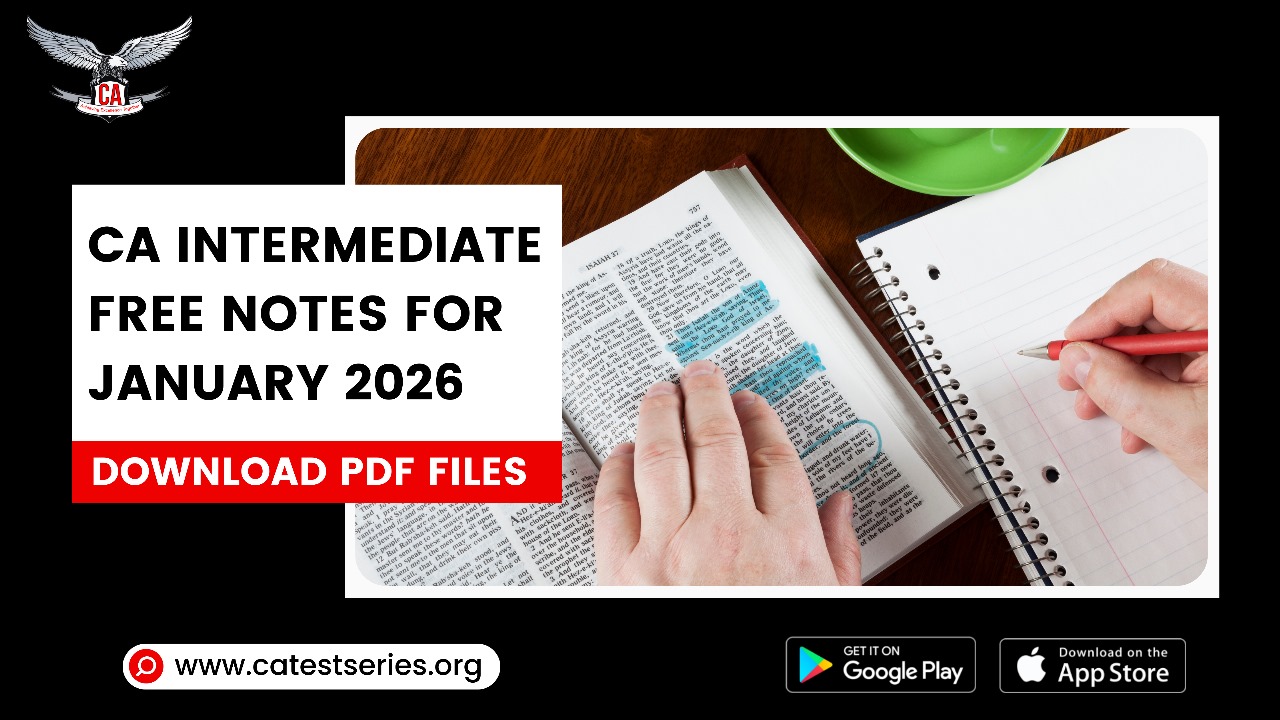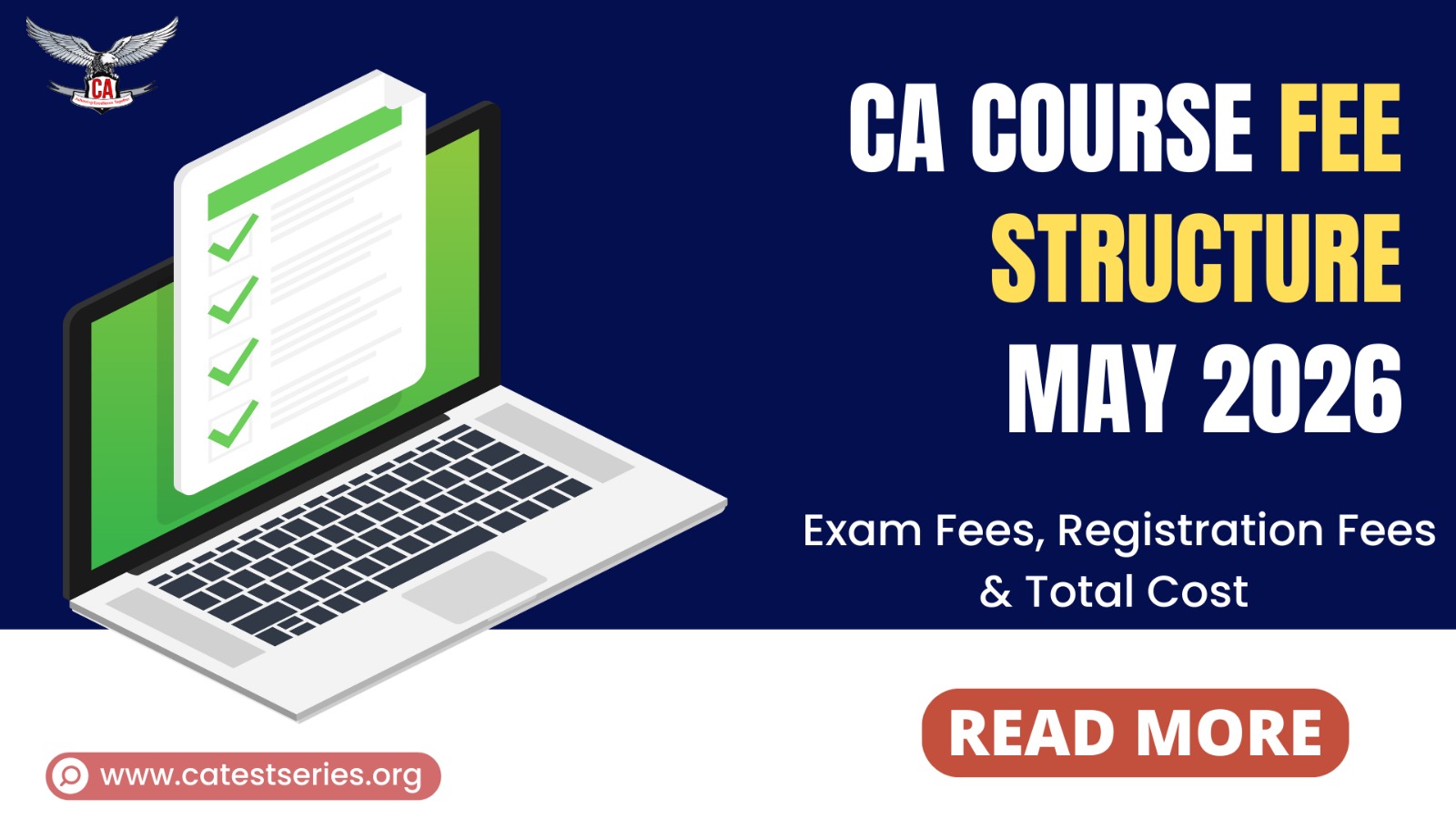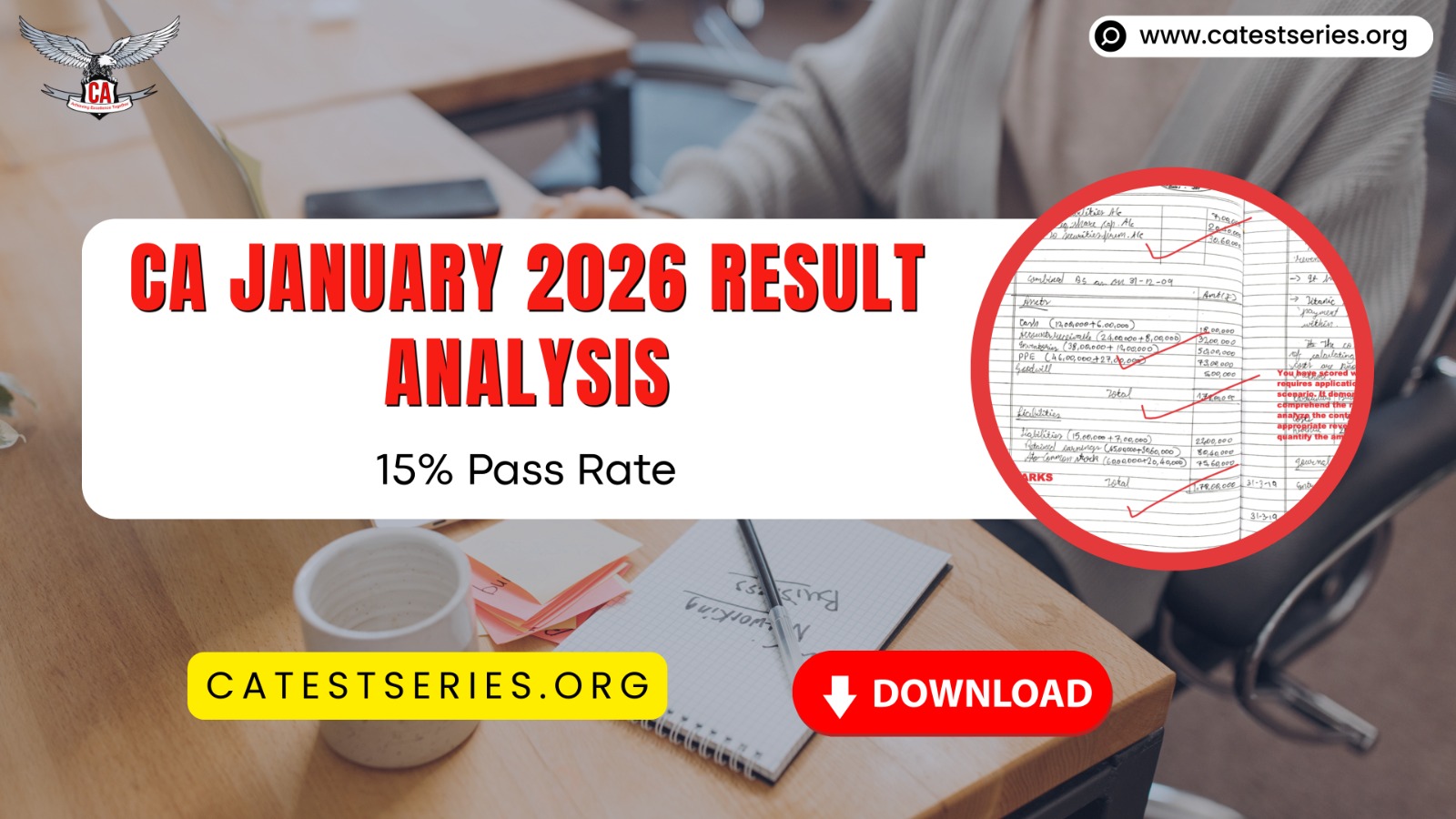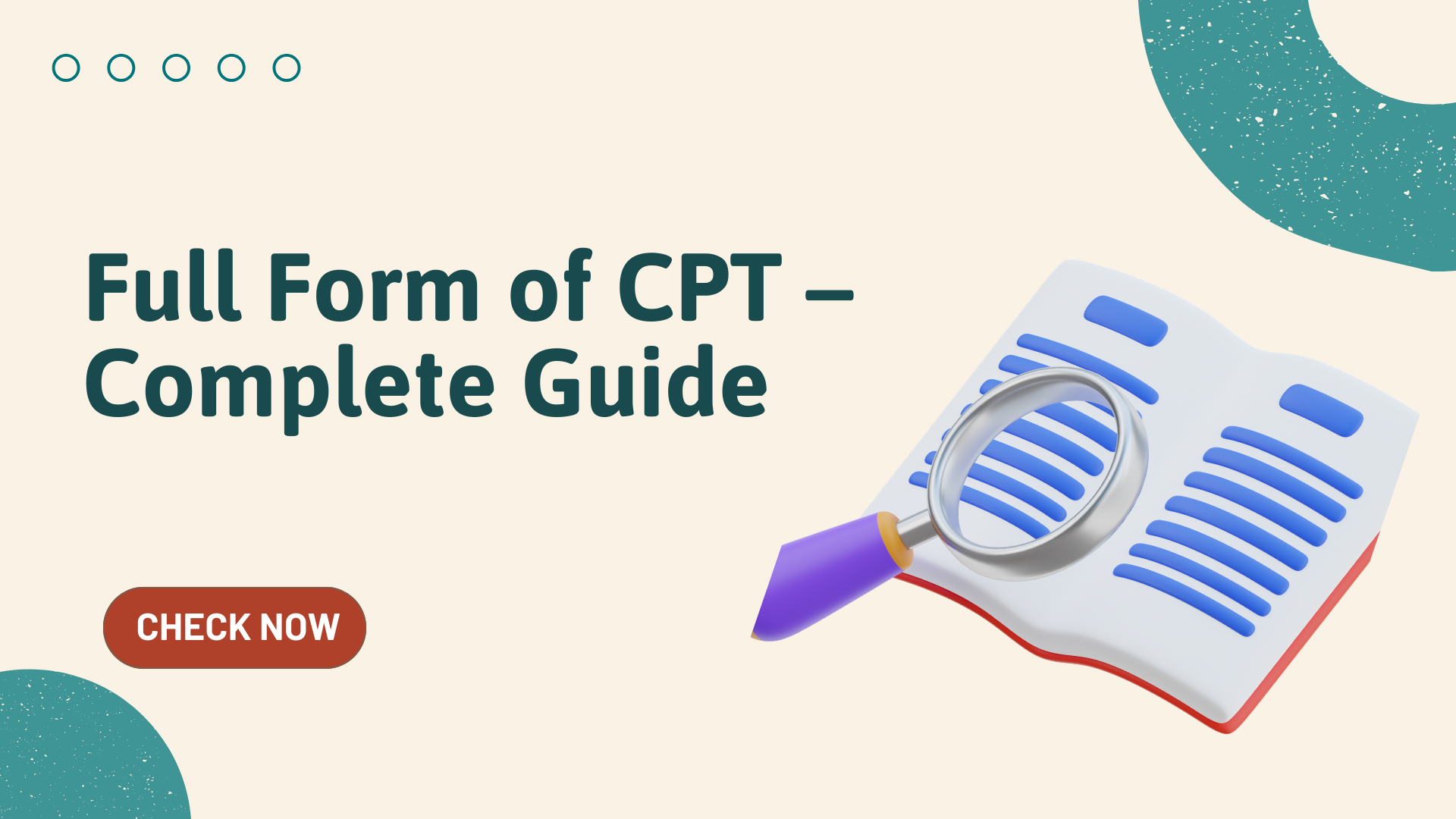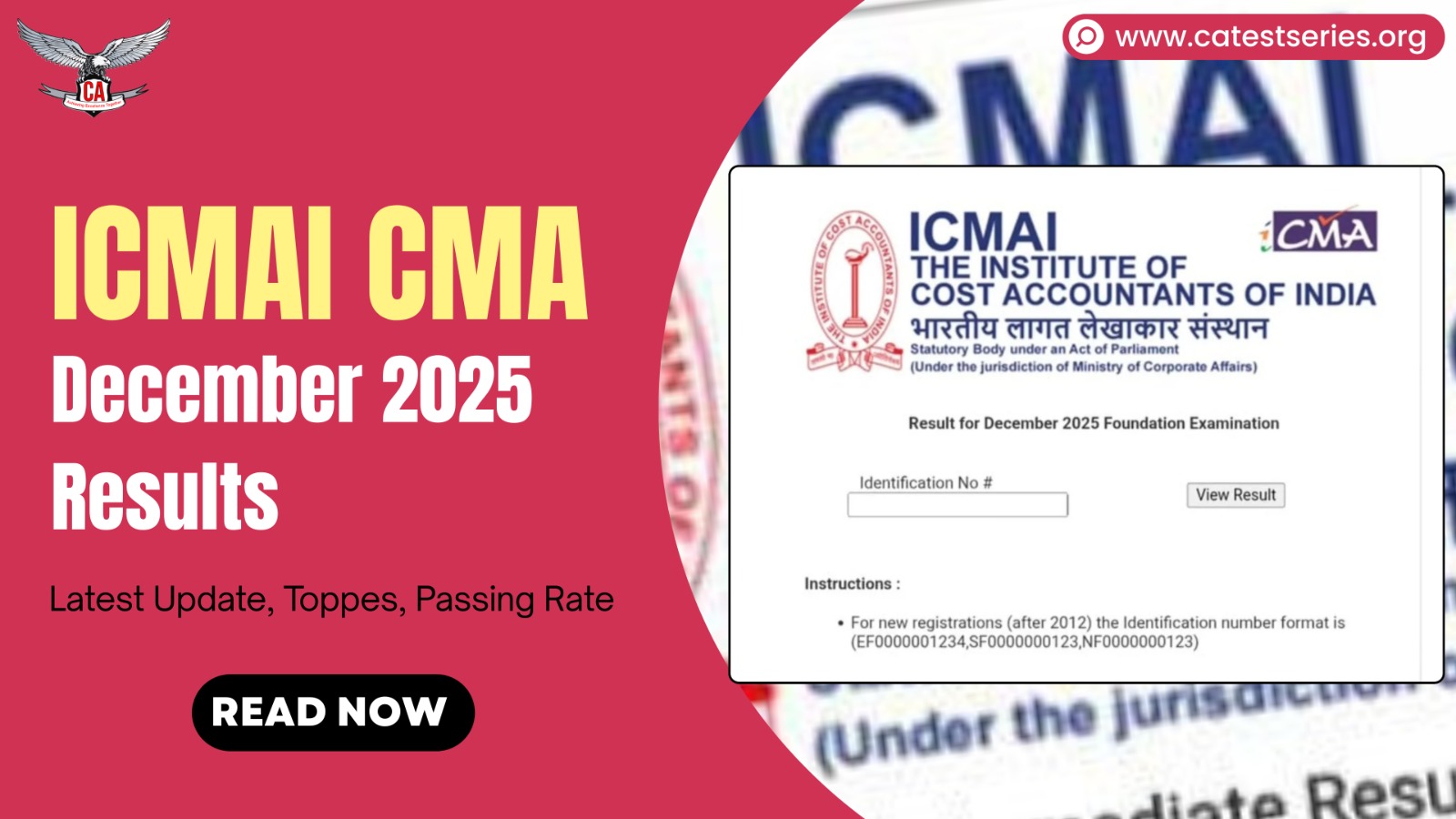CA Inter Updated chapterwise Weightage of Each Subject
As the modern economy skyrockets rapidly, the professions in finance and accounting are gaining immense popularity. A Chartered Accountant becomes the most recognised professional in this field. CA is broadly regarded as burdensome thus far in the career path. It requires strong determination. After clearing the CA Foundation, the candidate should focus on clearing the CA Intermediate.
CA Intermediate is the second milestone in the CA line that you need to clear to move forward to the final level. At this level, the difficulty level increases, and disciplined and strategic preparation becomes extremely important. Start practice early and regularly through the CA Test Series. As this level demands deeper conceptual understanding and consistent efforts, ensure timely preparation to avoid last-minute pressure.
CA Inter Subject-wise weightage
CA Intermediate split up Group I and Group II. Each group contains three papers. All six papers have different weightage chapters. Use the ABC Analytics method for each chapter for proper revision.
Paper 1: Advanced Accounting
Advanced Accounting deals with accounting concepts used in complex business structures. It covers accounting for mergers, liquidation, amalgamation of companies, branches, and accounting for foreign operators. Advanced Accounting focuses on how the financial statements are formulated and scrutinised. It strives to expand analytical skills to control the advanced financial statements.
ADVANCED ACCOUNTING | |||
| Chapter No. | Chapter Name | Marks weightage | ABC Analysis |
1. | Introduction to Accounting Standards | 4 | C |
2. | AS 1-5 | 8 | A |
3. | AS 6-9 | 8 | A |
4. | AS 10-13 | 8 | A |
5. | AS 14-18 | 8 | A |
6. | AS 19-24 | 8 | A |
7. | AS 25-29 | 8 | A |
8. | Company Accounts | 6 | B |
9. | Buy Back of Securities | 4 | C |
10. | Amalgamation | 10 | A |
11. | Internal Reconstruction | 8 | A |
12. | External Reconstruction | 8 | A |
13. | Consolidated Financial Statements (CFS) | 12 | A |
14. | Branch Accounting | 6 | B |
Accounting Standard (AS), Amalgamation, and Consolidated Financial Statements (CFS) are major scoring subjects. Focus on AS, Amalgamation, and CFS to boost your scores.
Paper 2: Corporate and Other Laws
Corporate and Other Laws centres on the legal framework of companies and other business entities. It sheds light on the formation of companies and the management responsibilities. It focuses on key commercial laws that influence business decisions and maintain legal discipline in the economy.
CORPORATE AND OTHER LAWS | |||
Chapter No. | Chapter Name | Marks weightage | ABC Analysis |
| Part 1: Company Law & LLP | 70 Marks | ||
1. | Preliminary | 4 | C |
2. | Incorporation of the company | 5 | B |
3. | Prospectus and Allotment of Securities | 5 | B |
4. | Share capital and Debentures | 5 | A |
5. | Acceptance of Deposits by Companies | 6 | B |
6. | Registration of Charges | 5 | B |
7. | Management and Administration | 8 | A |
8. | Declaration and payment of dividend | 6 | B |
9. | Accounts of Companies | 5 | A |
10. | Audit and Auditors | 8 | A |
11. | Companies Incorporated Outside India | 3 | C |
12. | Winding Up | 4 | B |
13. | LLP Act, 2008 | 8 | A |
| Part 2: Other Laws | 30 Marks | ||
1. | FEMA, 1999 | 10 | A |
2. | The General Clauses Act | 8-10 | B |
3. | Interpretation of Statutes | 8-10 | B |
Management and Administration, FEMA, 1999, can help boost scores, as it consists of more marks than other chapters, the LLP Act, 2008, the General Clauses Act, Audit, and the authors also received slightly higher marks.
Paper 3: Taxation
Taxation is the system through which the government collects taxes from individuals and business entities to generate revenue for public welfare. Taxation is the study of Income and Indirect tax. It helps to understand tax liability and the filing process.
TAXATION | |||
| Chapter No. | Chapter Name | Marks weightage | ABC Analysis |
| Part 1: Income Tax | 50 Marks | ||
1. | Basic Concepts | 4 | B |
2. | Residential Status | 4 | B |
3. | Salaries |
14 |
A |
4. | Income from House Property | ||
5. | PGBP | ||
6. | Capital Gains | ||
7. | Income from Other Sources | ||
8. | Clubbing Provision | 4 | B |
9. | Set off & Carry Forward | 6 | B |
10. | Deduction (80C-80U) | 6 | A |
11. | Advance Tax & Return | 6 | B |
12. | TDS/TCS | 6 | A |
13. | Assessment Procedure | 4 | C |
| Part 2: GST | 50 Marks | ||
1. | GST: Concept & Levy | 4 | B |
2. | Supply Under GST | 6 | A |
3. | Charge of GST | 4 | B |
4. | Time of Supply | 5 | B |
5. | Value of Time | 5 | B |
6. | Income Tax Credit | 10 | A |
7. | Registration | 4 | B |
8. | Tax Invoice and E-way Bills | 6 | B |
9. | Payment of Tax | 4 | B |
10. | Returns | 2 | C |
Chapters such as Salaries, Income from House Property, PGBP, Capital Gains, Income from Other Sources, and Income Tax Credit of GST are scoring chapters.
Paper 4: Cost & Management Accounting
Coast & Management Accounting focuses on analysing, collecting, and interpreting financial data and interpreting costs for internal management. Techniques such as marginal sorting, budgeting, and standard costing are also included. It helps management to monitor profit planning, improve efficiency, and control costs.
COST & MANAGEMENT ACCOUNTING | |||
| Chapter No. | Chapter Name | Marks weightage | ABC Analysis |
1. | Introduction to Costing | 3 | C |
2. | Elements of Cost | 12 | A |
3. | Cost Sheet | 10 | A |
4. | Material Cost | 10 | A |
5. | Employee Cost | 7 | B |
6. | Overhead | 10 | A |
7. | Methods of Costing | 8 | A |
8. | Cost Control & Analysis | 15 | A |
9 | Budgetary Control | 10 | A |
10. | Standard Costing | 10 | A |
Each chapter of the subject Cost & Management Accounting is highly recommended to be revised properly. Cost Control & Analysis contains higher marks than the rest of the chapters.
Paper 5: Auditing & Code Of Ethics
Auditing & Code of Ethics focuses on an examination of ethical principles and financial statements governing professional conduct. It covers audit evidence, planning, professional conduct, and reporting. Auditing & Code of Ethics play a vital role in ethical values like accountability, transparency, integrity, and public trust in financial reporting.
AUDITING & CODE OF ETHICS | |||
| Chapter No. | Chapter Name | Marks weightage | ABC Analysis |
1. | Nature, Objective & Scope of Audit | 6 | B |
2. | Audit Strategy, Planning & Programme | 8 | A |
3. | Risk Assessment & Internal Control | 10 | A |
4. | Audit Evidence | 12 | A |
5. | Audit of Items of Financial Statements | 15 | A |
6. | Audit Documentation | 6 | B |
7. | Completion & Review | 8 | B |
8. | Audit Report | 8 | A |
9. | Special Features of Audit of Different Entities | 10 | A |
10. | Audit of Banks | 8 | B |
11. | Ethics & Terms of Audit Engagement | 8 | B |
Topics such as Audit of Items of Financial Statements, Audit Evidence, Special features of Audit of Different Entities, and Risk Assessment & Internal Control are score boosters. Focus on these topics more than other topics.
Paper 6: Financial Management (FM) & Strategic Management (SM)
Financial Management (FM) focuses on the principles of managing funds for an organisation. FM includes capital budgeting, working capital management, financial planning, and cost of capital. Financial Management helps in understanding risk management, fund utilisation, and maintaining adequate liquidity. Meanwhile, Strategic Management (SM) deals with executing strategies to ensure long -term performance of an organisation. It also includes environmental analysis, formulating and implementing the strategy, which helps you achieve an advantage and stability in a dynamic business.
FINANCIAL MANAGEMENT & STRATEGIC MANAGEMENT | |||
| Chapter No. | Chapter Name | Marks weightage | ABC Analysis |
| Part 1: Financial Management (FM) | 50 Marks | ||
1. | Financial Analysis & Planning | 6 | B |
2. | Financing Decisions | 10 | A |
3. | Cost of Capital | 10 | A |
4. | Capital Investment Decisions | 10 | A |
5. | Dividend Decisions | 6 | B |
6. | Working Capital Management | 8 | A |
| Part 2: Strategic Management (SM) | 50 Marks | ||
1. | Introduction to SM | 6 | B |
2. | External Environment Analysis | 8-10 | A |
3. | Internal Environment Analysis | 8-10 | B |
4. | Strategic Choices | 8-10 | A |
5. | Strategy Implementation & Control | 12 | A |
Chapters in Financial Management (FM) and Strategic Management (SM), such as Financing Decisions, Cost of Capital, Capital Investment Decisions, External and Internal Environment Analysis, and Strategic Choices, are slightly scoring topics.
Check Out the CA Intermediate Syllabus
The syllabus of CA Intermediate has undergone various changes. Within the revised scheme of education initiated by ICAI, there has been an upgradation. Once you have gone through the complete syllabus, it is time for you to get ready to start with the preparation, and for that, you need to study your timetable and schedule. You can prefer the CA Test Series Schedule; ensure to follow your schedule with utmost attention and dedication if you wish to score well at this level.
Study the CA Intermediate Exam Pattern
- The Institute of Chartered Accountants of India (ICAI) introduced the new exam pattern for the CA Intermediate level. The exams will be conducted offline, just like any other exam. Individuals preparing to take the CA Intermediate level exams must study the exam pattern of their respective year to understand the changes between the old and new schemes, as well as several aspects related to the question paper.
- As per the CA Intermediate exam pattern, 70% of the paper will hold subjective, long questions, and the remaining 30% consists of MCQs. The exam pattern consists of 6 papers, distributed into two groups. Hence, there are three papers in each group, which is as per your choice to appear for once at a time.
- The exam for the CA Intermediate Group 1 will be first, and then, after a few days, you will have to give the exam for Group 2. According to the latest exam pattern, students must score a minimum of 50% overall and 40% each paper to qualify for the CA Intermediate level.
If you have already applied for this years session, you should go through the CA Intermediate exam pattern so that there is no room for doubt and confusion when your exams are around the corner. With a reliable and trusted CA Inter Test Series, you will be able to manage your study plan and receive professional assistance to acquire a great rank in this level.
Know the Topic-wise Weightage of Each Subject
Every year, ICAI provides modules that contain comprehensive information related to the topics included in various CA Intermediate subjects. Do not forget to practice the CA Inter Mock Test once you covered your entire syllabus. Let us start with the papers of CA Intermediate with the distribution of marks –
Group I
Paper 1: Advanced Accounting (100 Marks)
Paper 2: Corporate Laws (100 Marks)
- Part I: Company Law (60 Marks)
- Part II: Other Laws (40 Marks)
Paper 3: Taxation (100 Marks)
- Section A: Income-tax Law (60 Marks)
- Section B: Indirect Taxes (40 Marks)
Group II
Paper 4: Cost & Management Accounting (100 Marks)
Paper 5: Auditing and Ethics (100 Marks)
Paper 6: Financial management & Strategic management (100 Marks)
- Financial Management (50 Marks)
- Strategic Management (50 Marks)
The professionals in the Chartered Accountant field advised candidates to trust and follow the study material provided by the ICAI for the CA Inter exams. However, to prepare quickly and easily, you should follow your handwritten and precise notes along with the study material provided by the ICAI.
Also, check out the following:






